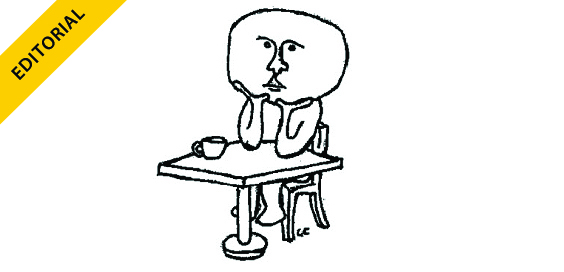Editorial: The imperfect can be good

File photo
Last weekend, I performed my senior violin recital in Calvin’s Recital Hall. Standing in front of dozens of friends, family members and teachers, I played the notes I knew so well: the opening melody of Mendelssohn’s violin concerto. Then the strident triplets, the lyrical second theme, the tempestuous cadenza and so on.
Things were going wonderfully until they weren’t, and in that strange record-skip of memory that nerves can bring on, my fingers failed me and I faked my way through a couple phrases. For what felt like a lot longer than a couple minutes, wrong notes, hesitant bowstrokes and a sense of panic replaced what was supposed to be the dramatic build up before the final presto. I’d ruined the mood, the arc of the piece. I’d — gasp — ruined Mendelssohn. Forgive me, Felix.
In retrospect, of course, that’s a ridiculous thought. Most of the piece went quite well, as did the rest of my recital program. And I had a very loyal and loving audience that I knew thought no less of me for my performance’s imperfections. Looking back from a few days later, I’m overjoyed with how that recital went, and the Mendelssohn incident is just the tiniest flaw in that joy.
No amount of practice can guarantee perfection. I know that. But the thought I’ve had a harder time dealing with throughout my time at Calvin is that I could’ve avoided that memory slip. By practicing a few more hours a week, carving out more time to perform in front of people and working on memorization earlier than two weeks out, I’m almost certain I could’ve kept it from happening. But I didn’t, because I chose instead to rest, keep up with schoolwork, spend time with friends and — maybe most significantly — work on Chimes. My musical performances were worse than they could’ve been because, to use Annie Dillard’s words, I didn’t make it my “one necessity.”
And yet, I loved nearly every moment I spent playing music at Calvin. And I think the nature and culture of the music department at Calvin gradually cultivated in me an attitude that I probably should’ve learned much earlier: things don’t have to be perfect to be good. Realizing that has taught me to balance ambition and humility, excellence and reality.
On any particular Friday morning over the last two years, I walked through Calvin’s Crossing to my first class, excited to pick up Chimes. I knew we had a great front-page story or an exciting layout or some other reason I couldn’t wait to see our hard work in print.
And, some weeks, things were going wonderfully until they weren’t.
I’d spot a typo in a headline. A reporter would call me and say we forgot to replace last week’s text on the front page. We’d get a website comment pointing out a glaring factual error. A letter to the editor would come and explain how we’d completely misunderstood the topic of an article. An administrator would point out that our last-minte photo choice was misleading. I’m sure anyone reading this has a Chimes mishap or two from recent years in mind.
Some of this is just the nature of student publications: high turnover, overcommitted staff members, low budget, other priorities. But, as with the memory slip in Mendelssohn, many of these things could’ve been avoided. I could’ve read all our articles one more time before publication, or checked in with our writers more often, or spent more time giving careful feedback. It wasn’t all up to me, but some of it was, and I didn’t make it my “one necessity.”
And yet, I’m really proud of what Chimes has done during my time here. We’ve asked questions, amplified voices, started discussions, challenged assumptions. I’ve made amazing friends, learned from stellar advisors, interviewed inspiring people. I’m so thankful for the small part I was given to play in this paper’s century-long history and for the people who stood by my side.
This week, for the final time, my colleagues and I will edit each other’s articles, talk through layout choices, send the PDFs to the printer and wait excitedly for Friday morning, when thousands of people will read our bold, fragile words. It won’t be perfect. We probably could’ve done more.
But that’s okay. It has been good, and I am grateful.



Kay Walvoord • May 5, 2018 at 9:03 am
I love your thought process as I can relate both musically and editorially! What you wrote shows a balance of what my perfectionist nature still struggles with at an age well beyond yours. Bravo! And come play with Holland Symphony if you are employed nearby…
Kay Walvoord